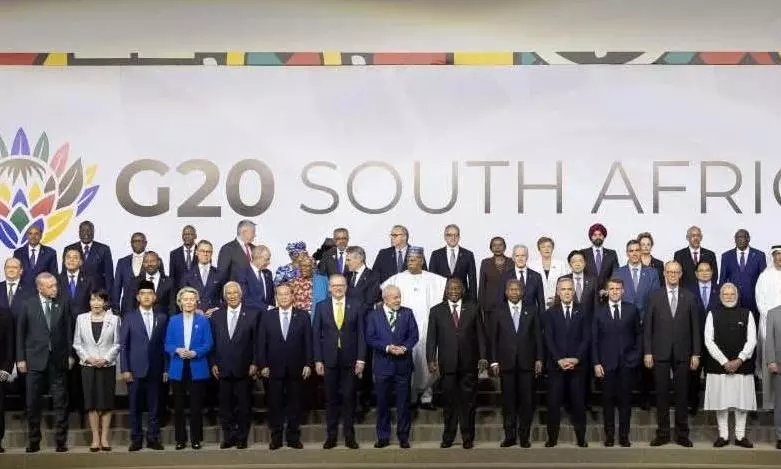
South Africa stated the US only wanted to send a diplomatic official from its embassy, calling it an insult to South African President Cyril Ramaphosa. Photo: @g20org
US-South Africa spat over G20 presidency clouds end of summit
South Africa’s rejection of a US envoy for the G20 presidency sparks a diplomatic spat, overshadowing the summit’s final day in Johannesburg

The G20 summit is set to end with a diplomatic spat between the US and the host country, South Africa, with the latter refusing to hand over the rotating presidency of the bloc to what it termed a junior US official.
The US has boycotted the two-day G20 meeting of leaders from rich and emerging economies in Johannesburg following the Trump administration's claims that South Africa is violently persecuting its Afrikaner white minority.
The US, which is set to take over as G20 president for 2026, said that it will host its summit at President Donald Trump's golf club in Doral, Florida.
‘Insult to South African President’
But South Africa insisted that a traditional handover ceremony at the end of this summit likely will not happen because the US only wanted to send a diplomatic official from its embassy, calling it an insult to South African President Cyril Ramaphosa.
Also Read: US boycotts own human rights review at UN, sparking 'American Apartheid' warning
“The United States is a member of the G20, and if they want to be represented, they can still send anyone at the right level,” South African Foreign Minister Ronald Lamola said. “It is the leaders' summit. The right level is the head of state, a special envoy appointed by the president of that country, or it could also be a minister.” South Africa said the handover would happen later, possibly at its foreign ministry building.
It was not clear if any US officials would attend the closing day of the summit.
What President Cyril Ramaphosa said
Tensions between the United States and South Africa intensified during the G20 summit in Johannesburg after President Cyril Ramaphosa claimed Washington initially declined to take part, only to reverse its decision shortly before the event.
Also Read: PM Modi calls for new global development parameters at G20 Summit
The White House rejected that account, insisting American officials planned only to attend the formal handover, and Press Secretary Karoline Leavitt accused Ramaphosa of “running his mouth a little bit against the United States and the president of the United States.”
Spat over leaders’ declaration
South Africa broke precedent by releasing a leaders’ declaration on the opening day, a move usually reserved for the end of a summit. The early release came despite US objections to a South African-led agenda that emphasised climate concerns and global inequality.
Also Read: Trump says US to boycott G20 in South Africa
Argentina also opposed the document, and its president, Javier Milei, skipped the summit. However, major economies including China, Russia, France, Germany, the UK, Japan and Canada supported the declaration, which urged greater global focus on issues facing poorer nations, from financial support after climate-related disasters to easing debt burdens and facilitating green-energy transitions.
South Africa claims ‘diplomatic win’
South Africa framed the declaration as a diplomatic win and a counterpoint to the Trump-era “America First” approach, although the text remained non-binding and omitted some of Pretoria’s priorities.
Also Read: Trump talks of G2, but dual global hegemony is whimsy for now
Notably, it did not refer to the proposed international panel on wealth inequality. Broader doubts about the G20’s relevance surfaced as the declaration’s 122 points included only a single mention of Ukraine, offering a generic call to end conflicts.
‘G20 struggling’
As French President Emmanuel Macron noted, while meeting in Africa was “an important milestone,” the bloc was still “struggling to have a common standard on geopolitical crises.”
Yet for many observers, the summit carried symbolic weight. Activist Max Lawson argued it was “the first ever meeting of world leaders in history where the inequality emergency was put at the centre of the agenda,” while Namibia’s President Netumbo Nandi-Ndaitwah said “the importance of addressing development priorities from the African perspective cannot be overemphasised.”
(With agency inputs)

